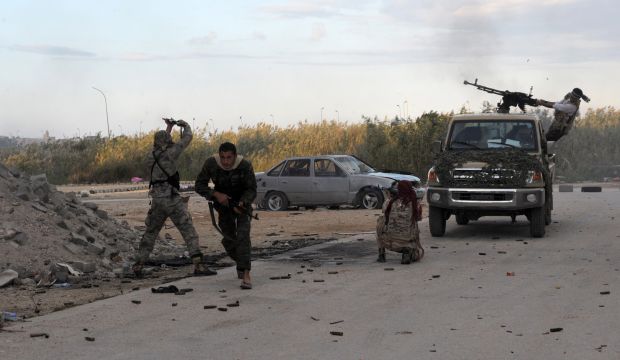
Members of the pro-government Libyan forces fire towards Islamist militiamen during an attack on districts held by the militias on November 3, 2014 around the port of eastern Libya’s restive city of Benghazi. (AFP Photo/Mohamed El-Sheikhi)
A senior figure in the Algerian government, who requested anonymity because he was not authorized to brief the media, told Asharq Al-Awsat: “Talks with the relevant Libyan factions remain ongoing, with the intention of hosting [them all] in one meeting in Algiers by the end of the month,” though he did not specify which factions the Algerian government had so far met with.
Algerian Foreign Minister Ramadan Lemara told reporters in September that Algiers was ready to meet with the different factions in Libya in order to prepare a summit with all groups in October.
Sources told Asharq Al-Awsat that the Muslim Brotherhood in Libya and the armed militias currently in control of large portions of the country are delaying the process, refusing to send representatives to the meeting.
The sources also said they expected the meeting would now also likely be delayed until after November due to the stances taken by these groups.
They added that these groups are specifically objecting to sitting down with Ahmed Gaddaf Al-Dam, the former close aide and cousin of late Libyan dictator Muammar Gaddafi—who will be representing groups and figures still loyal to the former regime in the meeting—as well as members of the former Free Libyan Army, a group of officers, military figures and soldiers who defected from Gaddafi’s army to join the fight against him.
Sources close to Gaddaf Al-Dam, who has been residing in Cairo since the start of the uprising against Gaddafi, told Asharq Al-Awsat he had indeed received an invitation from Algiers to attend the meeting, adding that he and other former regime members had accepted the invitation, while insisting that all sides needed to “act responsibly in order to save Libya from complete annihilation at the hands of the [Muslim] Brotherhood and the extremists.”
Meanwhile, Ezzedine Oqayl, leader of the Libyan Republican Coalition, a group formed following the uprising against Gaddafi in 2011, told Asharq Al-Awsat the meetings had been delayed due to the “early participation” in the process of former Gaddafi regime figures, leading to a standoff between the “Februarists”—members of revolutionary militias and volunteer groups which fought against Gaddafi in the uprising (known in Libya as the “February 17 Revolution”)—and the “Septemberists,” former supporters of Gaddafi, who overthrew Libya’s King Idris in September 1969 in a coup d’état known in Libya as the “September Revolution.”
The Gaddafi circle have reportedly asked for investigations to be carried out on the dictator’s killing in October 2011, and to reveal his burial place, which has angered the Februarists.
Libya has steadily descended into chaos since Gaddafi’s death. Disgruntled former members of the volunteer militias who fought against the dictator’s forces captured a number of the country’s most prominent ports, seizing tankers and oil shipments, earlier this year.
Libya’s then-prime minister, Ali Zeidan, was subsequently removed from office by renegade Gen. Khalifa Haftar, who also dissolved Libya’s Islamist-dominated parliament, the General National Congress in March, blaming the Islamists for the deterioration in the security situation, and of being in control of some of the armed militias.
An armed Islamist group from the city of Misrata then took control of Tripoli in August, capturing the country’s main airport from another rival militia group from Zintan.
Islamist rebels have also seized control of parts of Libya’s second city Benghazi, with Haftar’s forces now engaged in daily battles with them in a bid to wrest control of the city back into government hands.
The country also now has two parliaments, the internationally recognized Tobruk parliament and the government of Prime Minister Abdullah Al-Thani, and another, based in Tripoli and made up of former members of the dissolved General National Congress, who were reinstated by the militias currently in control of the capital.
The meeting in Algiers is expected to include all the major players on the current muddled political scene in Libya, including Haftar, Ali Al-Salabi, a leading member of the Muslim Brotherhood, and newly-elected head of the parliament in Tobruk, Ageila Saleh.
However, sources close to both Haftar and Saleh told Asharq Al-Awsat neither have received invitations to the meeting.
Oqayl said the three key figures at the meeting would indeed be Haftar, Saleh and Salabi, representing the army, the government in Tobruk, and the Muslim Brotherhood and the rival government in Tripoli.
He said all three were agreed on the four main issues the meeting was hoping to resolve: the legitimacy of the parliament in Tobruk, the necessity of forming strict guidelines for differentiating between “revolutionary” groups that were present in the fight against Gaddafi and Islamist groups, reviving the country’s security apparatus and giving the state and its institutions the central role in the fight against the extremist groups, and reviving the country’s standing army.
Monji Saidani contributed reporting from Tunis and Allam Boughamrasa contributed reporting from Algiers.
